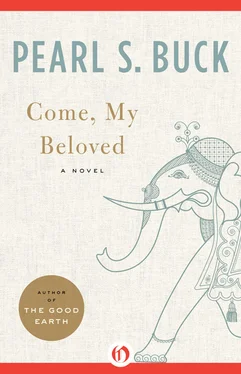HE ENTERED HIS OWN house with a firm step a few weeks later, and he gave his hat and stick and his gloves and overcoat to Enderby, the butler.
“Well, Enderby,” he said in his usual brusque greeting.
“Mr. MacArd, sir,” Enderby replied, bowing his head slightly. “I hope you had a good trip.”
“Excellent,” MacArd said. He turned to David, waiting just behind him. “Well, son?”
“Yes, Father?” David said. He understood his father well, he knew that the grizzled head held high and the blue eyes fierce with resolution simply meant that there was to be no mention of his mother. The house was empty in spite of its warmth and the many flowers arranged in the magnificence of the vistas. He felt very tenderly toward his father.
“What are your plans?” MacArd asked.
“I have none, Father,” David said in his equable voice. “I think I shall just go to my rooms and take my time, unless there is something you want me to do.”
“Not at present,” his father replied. “If you have nothing on your mind, I shall go on to my office and be home for dinner tonight.”
“Yes, Father,” David said again.
It was still early, they had breakfasted on the ship, and there was nothing he wished for so much as to be alone for reflection and meditation. Above all, he needed relief from his father, that dominating and oppressive presence which he knew was also powerfully loving. He had shared its weight with his mother all the years of his life, she had taught him to value his father and yet to know that he was unchangeable, and David could bear the knowledge while he had her with him, her gaiety, her humor, her life-giving vitality. The talent she had for absorbing herself in him and in his father, quite separately and yet always keeping the three of them together, had made the atmosphere of this immense house. Now that she was gone he was resolved to maintain it so far as he could do so alone, for her sake, and yet he had a quiet independence, his father’s thought filtered through the gentle blood of his mother, and he was determined also to find the life he wanted for himself and to live it.
“Will you have your luncheon served in your own sitting room, sir?” Enderby was asking, in a slightly raised tone.
“I’m sorry! Yes, if you please, Enderby, I shall spend the day there, I think, until my father comes home. I want to put my photographs away myself. I brought back a lot of them from India.”
“Very well, sir,” said Enderby, for whom India did not exist.
He went away and David mounted the wide marble stairs. There was an elevator at the end of the hall, but he liked the steps. His mother had descended them often while he stood at the bottom, his face uplifted to watch her come down, beautifully dressed, perhaps for the theater or a dinner party. When he was small he had raced down to be ahead of her so that he could see her descend, her train trailing behind her, and her arms and bosom bare except for her jewels.
His rooms were on the second floor, in the east wing, and a wide carpeted corridor led to the door. The house was completely quiet, and this was strange to him, for when his mother had been alive it seemed full of pleasant sounds, music somewhere, the piano or her lovely voice, an almost brilliant voice, or if not such music yet the house had been full of the sounds of living, her friends, the bark and whines of her pet dogs.
He entered the outer door to the rooms he knew so well and there they were before him, the doors open between, his bedroom and dressing room and bath, and here where he stood in his sitting room, and beyond it his study and library combined. The colors were crimson and cream; his mother had chosen them for him while he was in college, and the rooms looked fresh and yet familiar. He sat down in his favorite chair, and leaning back he closed his eyes.
India had made a profound impression upon him or perhaps it was not India but Darya. He had not been able to explain to his father how he felt about Darya. He had been drawn to the slender young Indian when he met him in London but there had been no time to talk with him. Darya was reserved then, he had seemed even cynical, at least dangerously humorous, his dark eyes quick and haunted, as though he saw everything and told nothing. He had wished that Darya was taking the same ship to Bombay for then he could have satisfied his curiosity about a man who attracted him so much and yet who seemed beyond the reach of understanding, but Darya had passage on a French ship a few days later and did not seem inclined to change. “I never travel on English ships,” he had said briefly. Yet he had no rancor toward the English there in Claridge’s where he had the best suite of rooms.
All the days they were in Bombay and when he was alone in Agra, wherever they stopped until they reached Poona, David had kept thinking of Darya. He had written to him before they left Bombay, reminding him of their agreement to see each other and Darya had replied courteously that he was at home, that he hoped that David would spend at least an afternoon with him.
That afternoon was, in a way he could not explain, the first comfort, the first assuaging, since his mother’s death. Until then he had simply followed his father, trying to be pleasant, as his mother would have said, but he had not been able to think at all, even about what he was seeing. He guessed that his numbness had made his father anxious, and that perhaps his father had felt him a burden, too. But Darya had lifted his heart or stirred his mind, he could not yet tell which, though Darya had said very little actually that he could remember. There was no entertainment beyond some cakes and honeyed milk, brought in by servants. None of the family appeared. They had simply wandered about the beautiful house and the flowering gardens, and Darya had pointed out one thing and another, the ivory carving set in a stone wall, the marble lattices brought from an ancient palace. It was not exhibited in pride or vanity, for many handsome objects Darya had ignored. He showed David the particular things that he loved, sharing with him the reason for his pleasure in them. The lotus, blooming in the vast central pool in the garden, their rose pink petals open under the sun, had moved Darya one day to suggest that they sit down on a marble bench and look at them.
“When the sun begins to sink,” he had said, “you will see the petals quiver and if you are patient, you can watch them close. You cannot actually see them move, you understand, but while you wait they close over the golden centers.”
And while they had sat in that garden of beauty where they seemed to be completely alone, although Darya told him that his two brothers and their wives and children lived here also, and that his married sister was visiting his parents with her children, Darya asked him a question which would have seemed strange except that they were in India and an Indian asked it.
“David, what is your religion?” This was the question Darya had asked.
He asked it as one might ask about an ancestor, a nationality or race, or a destination.
David had hesitated for an instant. “I suppose I am a Christian,” he said at last. “At least I am a member of a church.”
“Of Christianity I know nothing,” Darya said almost indifferently. He stooped and plucked a small purple flower that grew between the marble stones of the terrace encircling the pool. He wore his Hindu dress, and this made him less a stranger, David reflected, than he had been in the London hotel, dressed as an Englishman. There was an air of informality about the white silk robes that left Darya’s arms and legs bare, and he wore sandals instead of leather shoes.
“I know too little, myself,” David said honestly. “But my mother believed in God and in prayer. She taught me to believe, I suppose.”
Читать дальше












